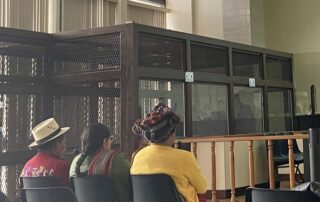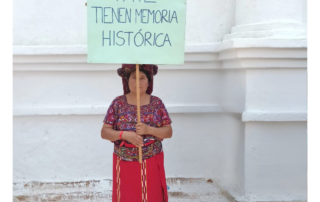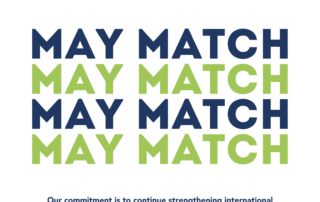Sepur Zarco
On February 26, 2016, indigenous women from the community of Sepur Zarco made history when they and their legal team successfully prosecuted former Guatemalan military officials for sexual and domestic slavery. Based largely on the testimonies of 15 Q’eqchi’ survivors, a Guatemalan tribunal convicted two men—former Military Commissioner Heriberto Valdez Asig and former Colonel Esteelmer Francisco Reyes Girón—of crimes against humanity for sexual and domestic slavery carried out at a military recreation center in the 1980s.
While the defendants faced charges for other crimes committed in the same context, including the forced disappearance of several of the women’s husbands, the trial holds national significance as the first transitional justice case in Guatemala to firmly center the experiences and impacts of sexual and domestic violence against women during the internal armed conflict.
When I became strong enough to be able to say what I had to say, I told the whole truth. That was what gave me strength…The moment came that we had been waiting for, for so long – to see justice.
In-depth NISGUA reports

Q’eqchi’ women set a precedent in Guatemala with first-ever conviction for sexual and domestic slavery.

Report-back from the “Guatemalan Women Healing Towards Justice” tour, featuring Maudi Tzay from the Alliance to Break Silence and Impunity.
In the early 1980s, communities in the Polochic Valley in Guatemala challenged wealthy landowners for legal titles to their ancestral lands. Around the same time, Guatemalan dictatorships constructed several military bases around the region of Sepur Zarco with the support of the U.S. The base built in Sepur Zarco was designated a military recreation center, where troops would return after taking 15-day rotations patrolling the surrounding mountains.
The soldiers at the Sepur Zarco military base disappeared men from the community who were seeking land titles, demonstrating the powerful connections between wealthy elites and the military. The women that survived them were then forced into sexual and domestic slavery for years. The trial illustrated how patriarchy and racism play out on women’s bodies in war. Grounded in the recognition that these systems endure today in Guatemala and the world over, the women survivors prosecuted this case as part of a multi-faceted strategy for social change. To do so they worked with a coalition of feminist, legal, and psychosocial organizations known as the Alliance to Break Silence and End Impunity.

Photo: CPR Urbana
The intergenerational struggle for access to and protection of land
After the verdict, the courts ordered 18 reparations to redress the physical, psychological, and material impacts of the violence. These include increased access to healthcare and education for survivors and community members, and legal reforms to reduce the barriers against survivors of sexual violence. The reparations focused on repairing harm, dissuading future violence, and community healing.
Survivors repeatedly testified to the psychological and economic impact of their husbands’ disappearances and how a lack of land access has perpetuated poverty. To carry out court ordered reparations, the Guatemalan national land registry must grant land titles and prioritize families of those forcibly disappeared while in the process of registering their land. Nonetheless, almost three years after the sentence, survivors have yet to receive titling.

In Solidarity
The Alliance to End Silence and Impunity called upon the international community to stand in solidarity with the women survivors of Sepur Zarco to ensure the legal system respects the sentence. The Alliance made direct requests for accompaniment, reporting, and advocacy to broaden the social impact of the case on a global scale.
Members of NISGUA responded to this call by gathering together to educate themselves and express solidarity with the survivors. We strengthened movements in Guatemala and the U.S. by drawing direct connections with local feminist struggles for gender justice and indigenous solidarity.
Latest from our blog
Actualización caso Genocidio Ixil. Del 22 al 25 de abril de 2024.
Esta semana en la sala de audiencia hay colocados biombos que protegen la identidad de las mujeres víctimas de violencia sexual quienes brindaron su testimonio. Acompañaron en la sala de audiencias representantes de las [...]
Ixil Genocide Case update. April 22nd -25th, 2024.
This week, they placed screens in the courtoom that protect the identities of the women who were victims of sexual violence as they gave their testimony. With them in the courtroom were representatives of [...]
Estado del Caso: Genocidio Ixil, periodo de gobierno del general Fernando Romeo Lucas García (01 de julio de 1978 al 23 de marzo de 1982).
Antecedentes. Después de 36 años, Guatemala puso fin al Conflicto Armado Interno –CAI-, con el definitivo cese al fuego y la firma del Acuerdo de Paz firme y duradera el 29 de diciembre de [...]
Caso Genocidio Ixil-Lucas García
Durante la época del gobierno militar de Romeo Lucas García (1978-1982), el Estado y el ejército guatemaltecos diseñaron e implementaron su política de genocidio. Mientras Romero Lucas García estuvo en el poder, más de [...]
Actualización solidaria de abril
¡Bienvenides a la actualización solidaria de Abril! En este boletín, compartimos sobre el desarrollo del caso por Genocidio Ixil, a través de testimonios de sobrevivientes y expertos, conoceremos cómo este proceso llevado a cabo [...]
April Solidarity Update
Welcome to the April edition of our solidarity update! In this newsletter, we discuss developments in the Ixil Genocide case. Through witness and expert testimonies, we learn how this process, directed by the Association [...]














